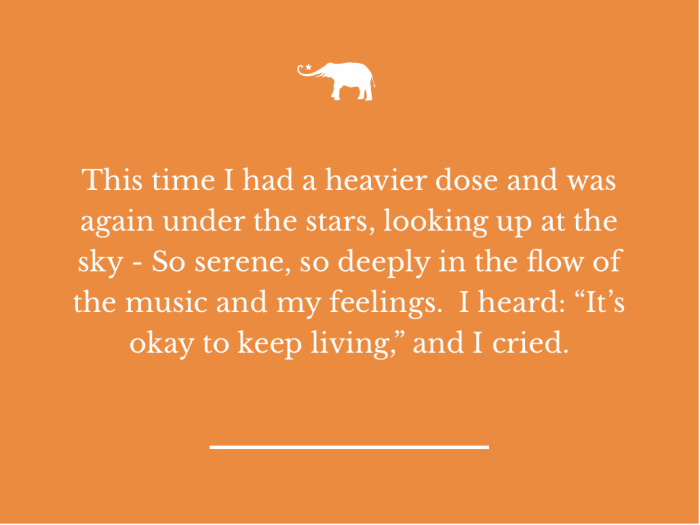My first experience on ketamine was a soft dreamscape of swirling colors and a deep sense of peace with the world. I remember feeling like I was under water, looking up at the night sky. It was something otherworldly, so private and sweet. When I came back I could not believe the places I had gone to in my therapist’s office. How could these two realities exist in the same space time continuum? I had taken ketamine as a lozenge to work on the depression I had been experiencing after my older brother died of a heart attack. Low mood, insomnia, ruminating on negative thoughts, angry outbursts…I had the classic signs of depression and I knew I wanted to try something other than daily medications. My brother’s death was sudden and really sad. I hated to think of how he had been found, dead and alone, in his one bedroom apartment. Did he know he was dying? Did he experience a lot of pain? I found myself thinking of that often. Was he okay? Where did he go, anyway?
I had read about ketamine in a New York Times article touting the ‘new revolution of psychotherapy.’ So much hype, I thought. Could it be real? Ketamine has been used for decades, primarily as an anesthetic. Even veterinarians use it on animals for back pain and some types of surgeries. It was also a ‘club drug’ of the 80’s, mostly in Europe. But there had been some studies that showed that ketamine was also an excellent antidepressant. It grows new dendrites in the brain, creating new neural pathways. With the formation of new neural pathways, different areas of the brain will fire – allowing greater access to coping strategies. When someone has been through long periods of stress it is believed that certain areas of the brain become less accessible. Like a worn path in the carpet, the brain can create habitual patterns that are very difficult to change. Ketamine also works on the glutamate receptors. Glutamate is a neurotransmitter, which helps the brain communicate with the rest of the central nervous system. Scientists think that increasing brain plasticity by turning off some glutamate receptors is how ketamine helps alleviate depression. Just one dose has been shown to assist with suicidal depression, quickly helping patients to feel markedly better.
So I gave it go – and there I was, swimming in the sensations of being underwater, looking at the stars, feeling the most relaxed I had felt in a very long time. There was a new spaciousness in my mind, is the only way I can describe it. I could see my thoughts leading to negative territory and I could simply decide to stop thinking about that and move on. Amazing. The peaceful feelings lasted for a couple weeks and when I noticed the dark corners of my mind starting to beckon me again, more insistently this time, I made another appointment.
This time I had a heavier dose and was again under the stars, looking up at the sky – it felt like Lake Tahoe at night. So serene, so deeply in the flow of the music and my feelings. I heard: “It’s okay to keep living,” and I cried. I hadn’t realized that a lot of what I was feeling was guilt for having survived our childhood. How did I make it and he did not? I don’t have that answer but I do now believe that it is okay to keep living, loving and making friends. I can do it for him. Maybe wherever he is, he might benefit from seeing me live out my dream. I remember feeling filled with love, with total gratitude for my life and all of my friends and family. “Maybe if I just focus on the love I have, I can let go of the pain of not getting enough love when I was little.” That seemed like a good idea. I stayed with that for a while. I then noticed some shadows coming in – the doubt and the fear coming back. I watched them enter and received the information that this was just a part of me, a part of my experience, but not the whole of me. That the critical part of myself was going into overdrive, trying to keep me safe but it was increasing my loneliness. This time I had the awareness that the critical part of me was something I could separate from. That it wasn’t me, it was a part of me that needed to be loved. How do I shrink the critic? I asked. Suddenly I was filled with gratitude again. My heart felt so very grateful for life, for the opportunity to know my friends, to feel loved by so many. I remember seeing all of my friends’ faces and sending them love. There was the antidote for the critic I learned: let yourself dwell on what makes you grateful.
Once I had a chance to experience this I wanted to share it with my clients, and as a counselor myself I decided to get training on Ketamine Assisted Psychotherapy. There are many companies offering ketamine online without any psychotherapy and I really don’t believe that real, durable progress is possible without having someone to support you in changing your life. Many people will have experiences under the influence of ketamine that will need to be explored and integrated. This medicine can bring up past trauma and therapy is an excellent way to help complete and transform the unfinished business of our past. Integrating the imagery, feelings, and overall experience is a very important part of recovery. I know for myself, having a counselor present for me in this process was extremely helpful. She could remind me of some of the information I had received and help me stick to the positive changes I was making. The mind is a creature of habit and if you don’t have someone to assist you in seeing your life differently, change is going to be very difficult. It’s really that simple. What I have seen in my practice is that the old habits the depression loves: going to bed, avoiding tasks, isolating, all those things suddenly seem to loosen their grip. Clients no longer find those strategies compelling and they try different behaviors. I had a client who had a habit of going to bed when overwhelmed. After about 3 treatments he noticed he was feeling better but then he had some scary thoughts: “What if this isn’t real? What if it doesn’t last? What will I do?” He went to bed feeling despondent and about 10 minutes later thought, “This is boring,” and went out and gardened. In 20 years he hadn’t been able to resist the pull of bed when feeling sad, but this time – he could. This kind of anecdote is repeated often with ketamine. Many patients recount stories of sudden breakthroughs, a shift from feeling stuck into action.
Of course, individual results may vary. Some people (about 30 percent) will not experience any big changes from this type of therapy, but nearly everyone finds the medicine to be deeply relaxing. Some clients speak with ancestors, or see a traumatic event replayed but from a distance, so that the fear is suspended and they can more consciously process it. One client saw his father who had passed a decade before on a journey. His dad looked into his eyes and my client said : “I love you dad, it’s not perfect.” Then he saw his son whom he had been having a hard time relating to and got the same message. “I love you son, it’s not perfect.” The message for him was that love is what it is, you can access deeper love by simply accepting where you are with that person. In our work together the trap of perfection was a large theme. He has learned to live with imperfections much more easily than before and many relationships in his life have benefited from this work.
It is very rewarding as a counselor to see my clients make the big changes they have wanted to make in a relatively short period of time. It is also wonderful to have a different tool to help clients access their own wisdom. For myself, I feel closer to something far deeper, far more intrinsic to my true self. I carry a sense of peace about the world that I did not have before. That has made all the difference during these exceptionally difficult times. If you are interested in learning more about this type of therapy, you can check out the Evolve Mind Wellness website: evolvemindwellness.com
Moksha Donohue, LMFT- somatic psychotherapist , ketamine assisted psychotherapist practicing in Sebastopol, Ca. You can find her at Evolve in Sebastopol or in private practice: sebastopolmft.com.


 Share on bsky
Share on bsky





Read 0 comments and reply